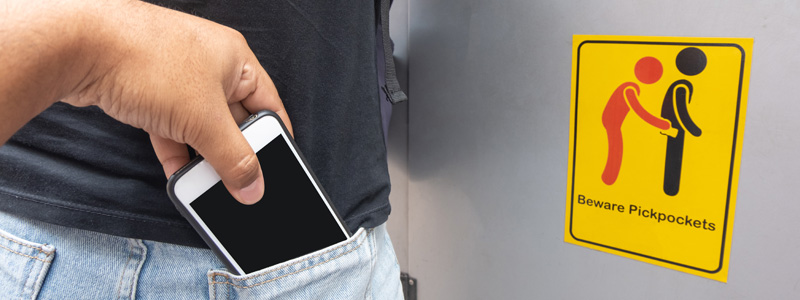We’ve been expats in the Netherlands since 2016 and only now are we having to deal with issues related to petty crime, specifically gangs of pickpockets and phone thieves. And in those intervening years we became complacent because crime is much lower here overall than in our native United States.
Until crime happens to you, it’s an abstraction.
Since last summer, we’ve had two friends robbed while we – my wife and co-CEO Cheryl – were literally a few meters away. It could have been us, but it wasn’t … and that’s part of the story.
We put together this post both with some tips about how not to become a victim and some of what we’ve learned the painful way about the gangs of thieves operating in our area. This post will be updated as we talk with local and national police to try to get answers to our main question: “Where are these people coming from?”
To some extent, we know. But the question becomes, why don’t the police know? And if they do know, why can’t they be more proactive when criminal gangs with crime records are on their radar?
(Editor’s note: In fairness, we have seen increased levels of security at railways stations and obviously, we can’t know what sort of facial recognition technology is in place.)
Professionals
You can walk though any Dutch train station – or any train stations anywhere in Europe, really – and see groups of two or more 20-something men loitering, seemingly just chillin’.
They are not there waiting for trains. They are waiting for you to get careless.
We were seeing off our friend Caroline and her family at a small, rural train station south of Eindhoven when pickpockets stole her iPhone. She hadn’t traveled much in Europe and had her phone in an exterior pocket on a cross-body purse in front of her. Two thieves simply sidled up next to her in the shelter on the train platform, unzipped it and took her phone without her ever realizing it.
What she did notice is that they were really close to her when the platform was practically empty. That was a huge red flag, but she didn’t have the experience or situational awareness to recognize it.
Our friend Lyn was in a shopping mall in Eindhoven when she became separated from us. The thieves, who could have been tracking our party of four, moved in and got her wallet out of her cross-body purse. It too was zipped and held right up against her. They likely targeted her because she’s small and older, moving more slowly toward the escalator as the rest of our group made our way to the parking garage.
A big, international business
Many of these gangs are professionals. They know when they filch your credit cards and debit cards they have a very brief window of opportunity before the cards are invalidated … that you’ll be getting alerts from the card companies.
The men who stole Lyn’s wallet took a leisurely trip back to Brussels, first stopping to make – or try to make – purchases at an Athlete’s Foot store within minutes of taking her card. They moved on to the Etos in Eindhoven Centraal station before boarding a train to Breda, stopping at the Spar supermarket to charge again before making the connection back to Brussels.
We tracked them from store to store as we saw the transaction notices on emails from Lyn’s account, but we never got close enough to corner them. We did talk to the store clerks, who told us the guys were Arab French speakers.
Caroline thought the two men she noticed were Arabic speakers and she was correct. Her iPhone had tracking, so she monitored its journey from Maarheeze station near where we live in Eindhoven to Brussels, then to its final destination in an electronics store in Bamako, Mali before it was likely sold and reformatted.
When you start doing research, you realize that this is a big and growing internationals business, with reports of gangs of pickpockets from Romania and Bulgraria working from Madeira to Denmark to London to the Republic of Ireland. The Paris Metro is a favorite of thieves. Barcelona is also a favorite target market.
These are not just rings of pickpockets. They also engage in human trafficking. Our daughter Lale was approached several times over a few weeks at Eindhoven station by young, well-dressed men speaking perfect English – and with identical come-on lines. We don’t think they wanted to steal her wallet; we think they wanted to steal her.
In 2019, a French court sentenced a group of 20 Romanian Romas to a total of 113 years in prison for theft, human trafficking and other offenses.
Tips
The BBC has a great post about how pickpocket gangs exploit a sophisticated understanding of human nature, including how to induce sensory overload so you miss the grab. It’s not all about nimble fingers.
DO:
• Always put your phone and wallet in your inside pockets, never in back pockets. If it’s summer, you might want to consider cargo pants with zippered pockets. Not so stylish, but really hard to get in to … though skilled pickpockets can.
• If you’re traveling, always alert your credit card issuer or bank to your itinerary, and that you’ll be in specific places. Most credit card issuers now have increasingly sophisticated algorithms that spot suspicious charges quickly and limit your account. And now even debit cards limit the amount of money you can lose to thieves.
• If someone bumps into you on the street, stop and check to make sure you still have your valuables. You only have seconds to react before they disappear.
• Listen to your instincts.
When the thieves slipped Lyn’s wallet out of her purse, she instinctively knew what happened and she called them on it. But the rest of us had moved on and she was by herself, so we didn’t hear her. And she didn’t pursue them because she didn’t want to falsely accuse anyone.
That was a mistake, and it wasn’t.
If your Spidey Senses tell you someone just grabbed your wallet even if they’re a skilled pickpocket, they probably have.
If you’re in a public place, it’s fine to start screaming because you can always apologize if you’re wrong.
• Get an encrypted password keeper app and keep all your credit card numbers and photos of your cards there. If your wallet is stolen or lost, you need your card information to cancel quickly.
DON’T:
• Phone thieves and pickpocket gangs size up your physical capabilities, age, size and how distracted or confused you are. Don’t look like a victim and try not to look like a tourist. Leave the camera at the hotel along with the guidebook. And be assertive. Even smaller people can carry themselves with a more aggressive and focused posture. Cheryl and I have been in Europe for decades, more than long enough that we fit in. And we both have a bit of attitude even when we’re not trying to. That’s a good thing.
That said, it didn’t keep us from getting our laptop stolen by high-tech thieves.
• If random or suspicious strangers try to engage with you, don’t. Americans find this difficult to do simply because we talk to everyone. And sometimes it’s actually fun to turn the game on the pickpockets. One time in Izmir, Turkey, I was shopping at a Sunday market, when two Roma women walked up on both sides of me at a vegetable stall and one bumped into me way too hard. I knew what they were up to, so I grabbed the woman on my right and started shouting in Turkish that she was a thief. This was a little risky because I wasn’t certain she really had robbed me. But after a few seconds of chaos, her accomplice came up and held out my wallet.
• Don’t put your phone or wallet in your briefcase or courier bag if you’re going to be in crowded public spaces such as train stations. It’s too easy for thieves to simply grab it and sprint off.
• Don’t carry a backpack. They’re so easy to get into without your knowing. Ditto for fanny packs, which mark you as a tourist.
• Don’t bring things you won’t use in Europe. If you’re not driving to the airport, leave your driver’s license at home. Ditto the Costco card, health club membership card or credit/debit cards you won’t use on your trip.
• Never, ever carry your passport with you on casual trips.
Situational awareness
As a survivor of six wars, I can tell you that you learn situational awareness very quickly or you quickly get into trouble.
In the military and intelligence services, you’re taught to always surveil your surroundings. Who’s in front of you. Who’s behind you. Who’s beside you. Who’s moving around and where they’re going. It’s a hard habit to learn, but once you do, it’s a hard habit to break. I’ve spotted people following my family a number of times in Europe, so just be aware.
If this sounds a little paranoid, it is. But you don’t have to make a show of it … after awhile, it becomes baked in to your consciousness.
A final note: If you’re fortunate to corner the thieves and the red curtain descends, remember that confronting them carries its own risks because they could be armed.
Unless you’re a middle linebacker for the Patriots or a Tier 1 operator, it’s best to let the police handle it while you start calling your credit card companies and blocking your credit cards. Even if you have them in custody, they could have handed off your cards to other people in their gangs.
It ain’t over till the paperwork is done.
Co-CEO of Dispatches Europe. A former military reporter, I'm a serial expat who has lived in France, Turkey, Germany and the Netherlands.















